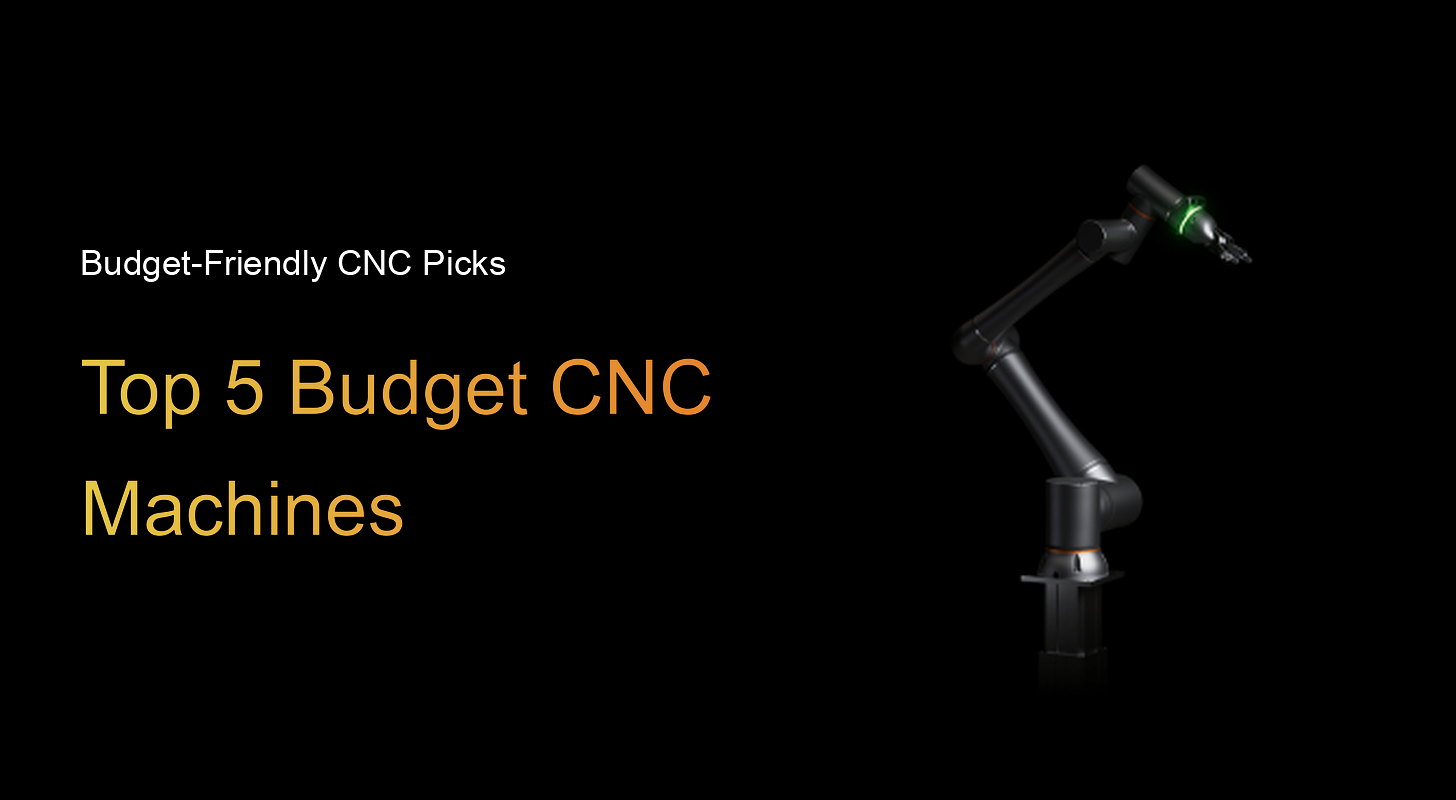You're asking a question that's worth some serious thought: "Do I really need a CNC lathe?"
Luckily, we’re here to help you make an informed decision. We'll explore what CNC lathes are all about, consider the costs and skills you'll need, and weigh the pros and cons. By the end, you'll have a solid grasp of whether this machine is the right fit for your needs.
The basics of CNC lathes
A CNC lathe is a machine that uses computer-generated instructions to control cutting tools, which shape materials like metal, wood, or plastic. Essentially, it spins a workpiece while a cutting tool moves to create a design—cuts, holes, or intricate patterns, you name it.
These machines are super versatile. From automotive parts and aerospace components to furniture and musical instruments, CNC lathes make it happen. Imagine you're a jeweler; a CNC lathe can help you craft complex rings or pendants with ease. Alternatively, if you're in automotive manufacturing, for example, think brake systems or engine parts.
Now, you might be wondering, "Why not stick to a manual lathe?" Well, for one thing, manual lathes are hands-on, requiring you to adjust settings yourself. CNC lathes, on the other hand, are the set-it-and-forget-it wizards of the lathe world. You input your design into a computer, and the machine takes it from there. This allows for incredible precision and a lot less room for error.
Practical factors to consider
Before you jump into the world of CNC lathes, there are some important factors you should weigh up. These considerations will help you determine whether investing in one of these machines is a smart move for you. First up, let's talk about the elephant in the room: do you actually need one?
Does a CNC lathe align with your goals?
This is the first and arguably most important question to ask yourself. Whether you're running a business or tackling a personal project, a CNC lathe is a tool—it should serve a purpose that aligns with your objectives.
One of the first things to consider is your production scale. Are you planning to produce items in large quantities or is this more about specialized, small-batch work? CNC lathes excel at both precision and repeatability, making them ideal for mass production. But if your projects are more one-off, you'll need to weigh up whether the investment makes sense.
The type of items you're producing matters, too. If the pieces require intricate detailing or complex geometries, a CNC lathe might be indispensable. However, simpler projects that don't demand a high level of accuracy could potentially be handled by less expensive methods or machines.
Also, if your market is flooded with low-cost, lower-quality alternatives, investing in a CNC lathe might not yield the return you're hoping for. So you need to know if your customers demand high precision. And are they willing to pay a premium for quality?
Finally, speed is often essential in production. If you're facing tight deadlines, the efficiency of a CNC lathe can be a game-changer. Once set up, these machines can work faster than manual lathes and with less hands-on involvement, freeing you or your workers to focus on other tasks.
Can you afford a CNC lathe?
Getting your hands on a CNC lathe isn't cheap, and we're not just talking about the initial price tag - which can range from a few thousand dollars for smaller, entry-level models to well over a hundred thousand for industrial-grade units.
The initial investment covers more than just the machine itself. You'll also need software to run it, any additional cutting tools specific to your projects, and possibly even a new computer if your current one isn't up to snuff.
Then there are the running costs. We’re talking electricity, routine maintenance, software upgrades, and replacement parts. Plus, you can't forget about materials for whatever you're creating.
With that said, the cost isn't meant to scare you away. It's about understanding what you're diving into. If you're producing high-value products, or if having the machine will significantly speed up your production time, those costs might be justifiable. But it's crucial to run the numbers and make sure they make sense for your specific situation.
Do you have the skillset for a CNC lathe?
A CNC lathe is not a smartphone where you can figure it out by poking around. There’s a steeper learning curve involved.
First off, you'll need some technical skills. Basic computer literacy is a must, as you'll be dealing with software to design and control your projects. Understanding of CAD (Computer-Aided Design) and CAM (Computer-Aided Manufacturing) software can be especially beneficial.
If these terms sound foreign to you or your workers, you may need to invest time in learning them or hire someone who already has this knowledge.
Understanding the basics of how machines work, particularly lathes, will also give you a leg up. This includes knowing how to set up the machine, what each part does, and how to troubleshoot problems when they arise. It's not rocket science, but it's not beginner-level either.
Your projects will likely involve different materials, whether that's metal, wood, or plastic. Knowing the properties of these materials, such as how they react under certain conditions or with certain tools, will also help you.
Do you have the workspace for a CNC lathe?
CNC lathes come in various sizes, but even the smaller models take up a decent chunk of real estate. Before even thinking about buying, measure your available space. Remember, you'll need extra room for maneuvering around the machine, storage for materials, and possibly a computer workstation.
It's not just the floor space; consider the infrastructure. Do you have the electrical capacity to handle the machine? Some CNC lathes require a three-phase power supply, which not all workshops have.
How will the machine even get into your workspace? Think about door widths and any potential obstacles. The last thing you want is to purchase a machine only to realize it won't fit through the door (we've seen it before!).
Adequate ventilation is essential, especially if you're working with materials that produce fumes or fine particles. You might also need fire safety measures in place, like extinguishers and alarms, depending on the materials you're using.
Benefits of owning a CNC lathe
1. Precision and accuracy: CNC lathes are champions of precision. We're talking down-to-the-micrometer accuracy here. If your work demands exact measurements and tight tolerances, this machine is your best friend.
2. Speed and efficiency: Once a CNC lathe is set up and running, it can crank out parts much faster than a manual lathe. This is particularly useful for high-volume projects. You load the program, set up the workpiece, and let the machine do its thing. Your output can increase dramatically, saving you time and potentially increasing your revenue.
3. Flexibility: Today it's automotive parts; tomorrow it's custom furniture pieces. The CNC lathe's versatility is one of its standout features. With the right setup and programming, you can produce a wide range of items, making it a flexible tool in your production arsenal.
4. Labor savings: Let's not overlook the labor aspect. A CNC lathe requires less hands-on work once it's up and running. This could mean you need fewer people on the shop floor, or it could free up skilled workers to focus on other important tasks, making your entire operation more efficient.
5. Quality consistency: When you're producing multiple pieces, consistency is key. A CNC lathe will produce part after part with the same high level of quality, reducing the likelihood of defects and the costs associated with rework.
6. Competitive edge: Owning a CNC lathe can give you a competitive edge. Whether you're selling your products or showcasing your projects, high quality and efficiency can set you apart from the rest.
Downsides of owning a CNC lathe
Let's balance the scales by talking about the downsides. No machine is perfect, and a CNC lathe is no exception. Being aware of the limitations can help you make a more informed decision.
1. High upfront cost: We've touched on this already, but it bears repeating: CNC lathes are expensive. The machine itself, along with all the peripherals like software and tools, can put a sizable dent in your budget. And that's before considering ongoing costs like maintenance and materials.
2. Maintenance requirements: CNC lathes are complex machines with many moving parts, and they require regular maintenance to keep them running smoothly. This could mean hiring a specialist or dedicating time to learn how to maintain the machine yourself, both of which have costs.
3. Energy consumption: These machines can consume a good amount of power, especially the larger, industrial models. If you're running it frequently, be prepared for your energy bills to rise.
4. Overkill for simple projects: If your projects are straightforward and don't require complex geometries or high precision, a CNC lathe might be overkill. A manual lathe or even simpler tools might suffice.
5. Space requirements: We covered workspace earlier, but it's worth mentioning again. The machine takes up space, and that's space you can't use for anything else.
Conclusion
Deciding whether to invest in a CNC lathe is no small matter; it's a choice filled with financial, skill-related, and logistical considerations. But it's also a decision that could open doors to new possibilities in your work.
On one hand, you've got the potential for increased efficiency, exceptional precision, and higher-quality products. On the other, there's the cost, the learning curve, and the ongoing maintenance to think about. The goal here isn't to persuade you one way or the other but to arm you with the information you need to make a choice that aligns with your unique circumstances and goals.
So, back to the question we started with: Do you need a CNC lathe? Well, only you can answer that, but hopefully, you're now better equipped to make that decision.
brighter future
Join thousands of creators
receiving our weekly articles.










